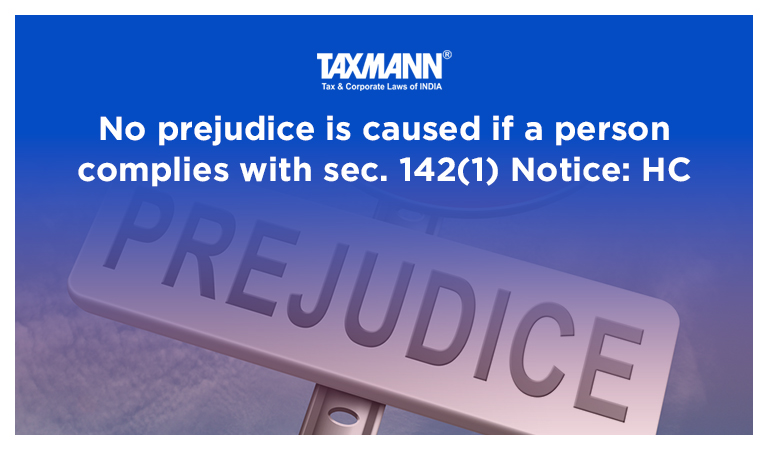No prejudice is caused if a person complies with sec. 142(1) Notice: HC
- Blog|News|Income Tax|
- 2 Min Read
- By Taxmann
- |
- Last Updated on 17 June, 2022

Case Details: Mrs Jayanti Dalmia v. DCIT - [2022] 139 taxmann.com 54 (Delhi)
Judiciary and Counsel Details
-
- Manmohan & Sudhir Kumar Jain, JJ.
- Ramesh Singh, Sr. Adv., Ms Shreya Jain & Gaurav Tanwar, Advs. for the Appellant.
- Ajit Sharma, Sr. Standing Counsel for the Respondent.
Facts of the Case
The Assessing Officer (AO) had received documents from the French official sources, indicative of the fact that the assessee was an account holder no. 2 of a Swiss Bank account in HSBC Bank.
The assessee was requested to furnish the details of the account opening form, complete bank statements, and residential status as on the date of opening of such foreign Bank Accounts. The assessee was also served with a notice calling upon her to co-operate and fill a consent-cum-waiver form to enable the tax authorities to obtain information from the Swiss Bank.
The assessee submitted that she was not obliged to fill such consent form as she had no connection with the foreign bank accounts. She further submitted that to ask the Appellant-assessee to furnish a consent letter is violative of Article 21 of the Constitution of India.
Since the assessee didn’t comply with notice section 142(1), the AO levied penalty under section 271(1)(b). CIT(A) and Tribunal upheld the order of AO. Aggrieved-assessee filed the instant appeal before the Delhi High Court.
AAR Held
The Delhi High Court held that if the assessee really had no connection with the Swiss Bank accounts, no prejudice would have been caused to her if she had complied with the notice under section 142(1) and filled the consent form.
Therefore, no question of law arises of consideration in the given case and the penalty imposed upon the assessee cannot be held to be erroneous and unwarranted.
List of Cases Reviewed
-
- Selvi v. State of Karnataka [2010] 7 SCC 263 (para 8) distinguished.
List of Cases Referred to
-
- Selvi v. State of Karnataka [2010] 7 SCC 263 (para 4)
- Sanjay Dalmia v. Pr. CIT [SLP (C) Nos. 15828 – 15829 of 2018, dated 10-7-2018] (para 6).
Disclaimer: The content/information published on the website is only for general information of the user and shall not be construed as legal advice. While the Taxmann has exercised reasonable efforts to ensure the veracity of information/content published, Taxmann shall be under no liability in any manner whatsoever for incorrect information, if any.

Taxmann Publications has a dedicated in-house Research & Editorial Team. This team consists of a team of Chartered Accountants, Company Secretaries, and Lawyers. This team works under the guidance and supervision of editor-in-chief Mr Rakesh Bhargava.
The Research and Editorial Team is responsible for developing reliable and accurate content for the readers. The team follows the six-sigma approach to achieve the benchmark of zero error in its publications and research platforms. The team ensures that the following publication guidelines are thoroughly followed while developing the content:
- The statutory material is obtained only from the authorized and reliable sources
- All the latest developments in the judicial and legislative fields are covered
- Prepare the analytical write-ups on current, controversial, and important issues to help the readers to understand the concept and its implications
- Every content published by Taxmann is complete, accurate and lucid
- All evidence-based statements are supported with proper reference to Section, Circular No., Notification No. or citations
- The golden rules of grammar, style and consistency are thoroughly followed
- Font and size that’s easy to read and remain consistent across all imprint and digital publications are applied



 CA | CS | CMA
CA | CS | CMA
